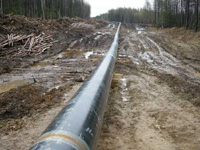Russia ends three-day suspension of oil supplies to Europe
Russia resumed pumping oil to Europe via Belarus on Thursday, ending a three-day suspension of supplies caused by a dispute between the former Soviet neighbors that has left lasting doubts in European capitals about Russia's dependability as an energy supplier.

The Russian state pipeline operator said that it had started deliveries to Germany and a number of Eastern European countries through Belarus at about 8:30 a.m. (0530 GMT).
"Russian oil is flowing through the Druzhba pipeline to Europe," OAO Transneft Vice President Sergei Grigoriyev told The Associated Press.
This followed a resumption of supplies late Wednesday by Belarus, which was compensating Russia for 79,000 metric tons (87,000 tons) of crude that it had illegally siphoned off, Grigoriyev said.
Belarus' isolated regime climbed down in the dispute, facing the threat of a full-scale trade war with its powerful neighbor, to which its economy is closely tied, the AP reports.
But the cutoff of Russian oil, only a year after a Russian dispute with Ukraine disrupted Europe's gas supply for a short while last winter, deepened EU concerns about its dependance on Russia for a quarter of its oil and over two-fifths of its natural gas.
"The disruptions in oil supplies have yet again undermined Russia's efforts to establish itself as a reliable source of fuel supplies to Europe," Deutsche UFG analysts wrote in a note to investors.
The spat centered on Russia's decision last month to impose a hefty duty of US$180 (EUR 138) per ton on oil exports to Belarus, with Moscow complaining that the previous duty-free regime cost the Russian budget up to US$4 billion (EUR 3.1 billion) a year in lost revenues. Belarus reaped billions in revenues by refining cheap Russia oil products and selling them at hefty profit to European markets.
Minsk - whose centrally controlled economy relies on cheap Russian energy and duty-free trade with Russia - responded last week by slapping a US$45 per ton tax on Russian oil pumped across Belarus to Europe.
On Monday, Russia stopped pumping oil to Europe via the Druzhba pipeline - whose name translates as "friendship" - and accused its neighbor of siphoning off oil in lieu of the duties.
By Tuesday, the stoppage had affected supplies to Ukraine, Germany, Poland and other East European nations.
With the European Union voicing alarm and Russia threatening crippling trade retaliation against its former ally, the countries' presidents - Vladimir Putin and Alexander Lukashenko - held talks by telephone Wednesday.
Soon after, Belarus' government announced the cancellation of the US$45-per-ton duty, and Prime Minister Sergei Sidorsky said he would fly Thursday to Moscow for meetings with his Russian counterpart.
It remained unclear what Russia had promised in return. Sidorsky was quoted as saying Thursday before his departure from Minsk that it was important to "remove all disagreements in bilateral trade which have recently arisen," the ITAR-Tass news agency reported.
Just before the new year, Belarus grudgingly agreed to a doubling of Russian natural gas prices under the threat of a cutoff of supplies, and the removal of the oil duty-free regime came as a double blow to its inefficient economy.
Analysts say that Putin has grown tired of supporting the authoritarian Belarusian leader, who has been dubbed the "last dictator in Europe" by some Western governments for his undemocratic rule and crackdown on dissent.
But in Europe, leaders criticized Russia for the sudden pipeline shutdown, which has renewed calls for a diversification of EU energy supplies.
EU Commission President Jose Manuel Barroso branded the supply dispute as "unacceptable" and bad for both Russia's and Belarus' credibility as suppliers and transit countries.
EU energy chief Andris Piebalgs warned Wednesday that the dispute will have lingering effects on the EU's relations with both nations.
Piebalgs said it would take "some time" to restore trust.
"You need to calculate what other action should be taken. In this respect, the damage is done but we very much wish to continue to use Russian oil but in stable conditions," he said.
Subscribe to Pravda.Ru Telegram channel, Facebook, RSS!




